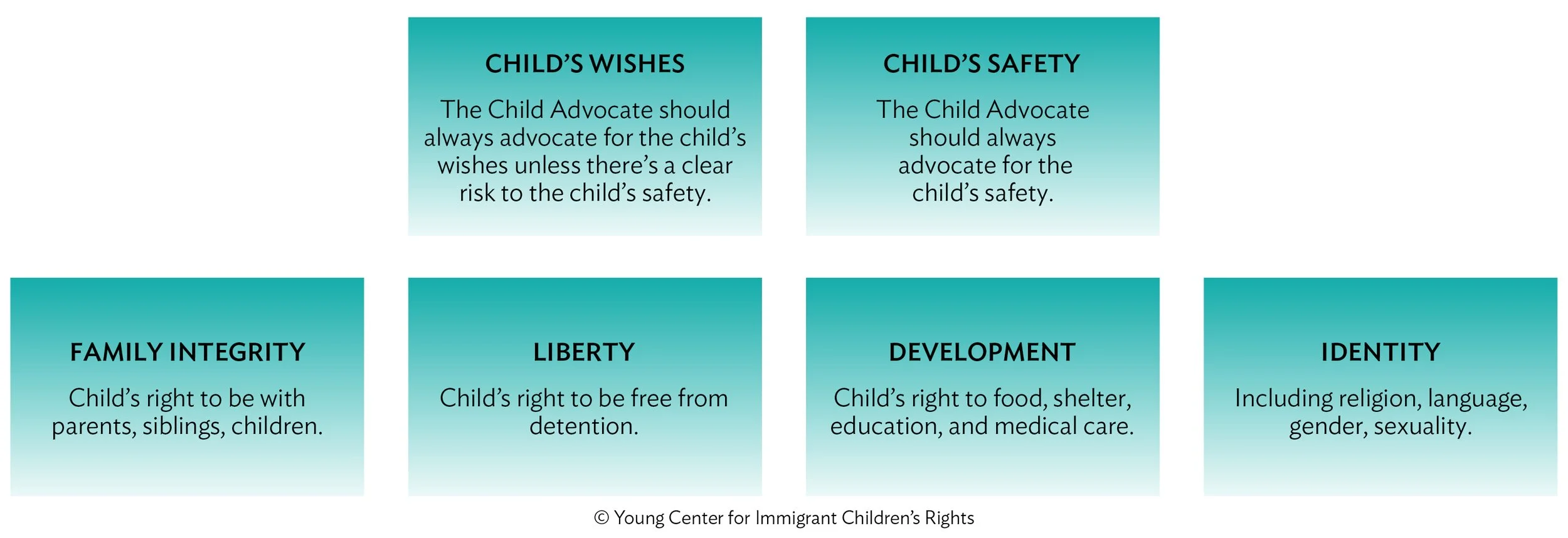Child Advocate Program
Child Advocate Program: Young Center is appointed as Child Advocate by the Department of Health & Human Services, Office of Refugee Resettlement (ORR). The role of the Child Advocate is to advocate for the best interests of individual children and ensure that all decisions on behalf of an immigrant child take into consideration the child’s best interests. The children served by the Young Center are those considered the most vulnerable, for example, children who have been abused, infants who are the subject of international custody battles, children who have developmental disabilities, young girls who want to live with their traffickers, those who have lost their parents to violence, and more. While in custody, these children are separated from their parents. They need an adult to advocate on their behalf, to ensure they have legal representation, to advocate for their well-being, to ensure decision makers, including immigration judges and asylum officers consider their best interests. After they are released, children are still in deportation proceedings and it is critical that the same decision makers receive fact-based information about their best interests from independent Child Advocates.
A Child’s Rights Paradigm: To recognize children’s rights as set forth under the Convention on the Rights of the Child and to minimize the risk that bias, stereotypes and subjective values influence our recommendations, the Young Center uses a paradigm based on child welfare and international law to evaluate each child’s best interests. This paradigm takes into account widely-accepted best interests principles of safeguarding a child’s safety and well-being and expressed interests, as well as the child’s rights to health, family integrity, liberty, development, and identity. The paradigm mirrors recommendations set forth by the federal Interagency Working Group on Unaccompanied and Separated Children’s 2016 Framework for Considering the Best Interests of Unaccompanied Children.
Our model: Under our model, the Young Center recruits and trains bilingual volunteers, such as teachers, retired attorneys, students, and other community members, to serve as Child Advocates. The volunteers meet with the children and learn their stories which often hold the key to figuring out whether they are eligible for protection. With this information, Young Center staff—attorneys and social workers—then advocate on behalf of the children, submitting best interests recommendations to immigration judges, asylum officers, enforcement officials, shelter providers and lawyers for the children. The best interests reports detail the issues at stake and make specific recommendations about the child’s safety and well-being. The Young Center serves a key role in ensuring the safety of the most vulnerable unaccompanied children, both while they are in custody and after they are released.
International Home Studies: Some children wish to return to their home countries, while others face removal against their wishes. In cases where children face repatriation, the Young Center seeks to determine whether the child can be safely repatriated, as required by the Wilberforce Trafficking Victims Protection Reauthorization Act. In cases where there are significant concerns about a child’s safety upon repatriation, the Young Center will contract out a social worker in the child’s home country to visit the child’s home and conduct a home study to determine whether it would be safe for the child to return. The Young Center uses these home studies to inform the best interests recommendations, which we then submit to attorneys and federal immigration authorities, including the Department of Homeland Security, immigration judges and the Asylum Office.
Through this work, the Young Center hopes to ensure the safety of individual children who either choose to or are forced to repatriate. In addition, the Young Center seeks reform more broadly in the immigration system by making the case that decision-makers should always request evidence of whether a child has a safe home to return to before ordering a child deported. These home studies cost approximately $1,000 per study and the Young Center raises private funds to do this work.

